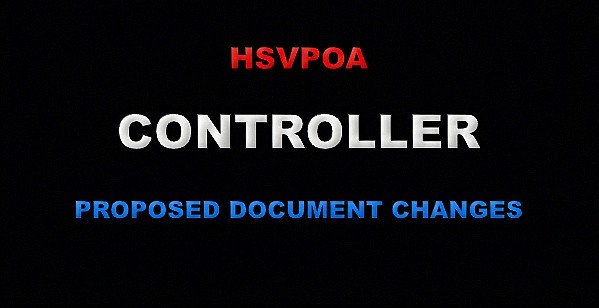At the Hot Springs Village Property Owners’ Board Discussion Session on November 3, 2021, Controller and Board Treasurer, Coreena Fetterhoff and the board discussed proposed by-law changes and the use of the terms: “supermajority” and “mega majority.” The following is discussion only and votes on these possible changes may not take place until the November 17, 2021 board meeting.
Fetterhoff: So, what was presented at the last meeting was the addition of section 6c, Establishment of Supermajority.
Click here to read the article titled, “HSVPOA Board Discussed ‘Supermajority’.”
Fetterhoff: So that is still proposed, along with the addition of Section d, which is: ‘Establishment of mega majority.’ The difference between the two – the supermajority is 2/3’s vote of a sitting board. And a mega majority is defined as a vote of all except one of the sitting board.
Fetterhoff: This was done in order to require the policy to have a mega majority to be changed. So the policy itself, which is…Article 29, Budget Prioritization Policy.
Fetterhoff: So, we’ve established a supermajority and a mega majority. That is the change to the By-Laws. [Proposed change]
Chair Joanie Corry: And the supermajority is?
Fetterhoff: Is 2/3’s.
Corry: And the mega majority is?
Fetterhoff: All but one seated vote.
Corry: And that is… Tucker, would you like to explain why?
Vice-Chair Tucker Omohundro: Well I think that there was confusion last time about the, we’ll call it the mega majority, that we were trying to put in that would actually determine what we could do within that article. And that’s not what we wanted. We wanted a supermajority, which is 2/3’s to take money inside that article from one place to another, in case of emergency. We wanted 2/3’s vote for that – not all but one. We wanted all but one to change the policy. And I think this has that cleared up, finally.
Corry: Does everyone understand? Are there any questions on that?
Director Pam Avila: Good clarification.
Omohundro: Yeah. It was a little vague before. I didn’t understand it. I didn’t want to still be in that position down the road and not understand it and not be able to make something happen if we needed it to happen.
Corry: Right. We did not want to paint ourselves in a corner. Okay. Anybody?
Omohundro: I like it. I think it does it.
Corry: Thank you, Coreena. Did that cover all three of them…?
Omohundro: [Indecipherable]
Corry: So Chapter 1, Article 2, Budget Policy?
Fetterhoff: Yes, so the revision there was to omit part of Section 6. It had stated, ‘The budget, with the exception of those line items related to areas of special accounting treatment, reference Chapter 1, Article 29, Section 4, may be modified by the vote of the Board of Directors.’ It was stricken so now it reads, ‘The budget may be modified by a vote of the Board of Directors.’
Omohundro: And that falls under the supermajority vote.
Fetterhoff: The next section does.
Fetterhoff: So this is everything outside of your special accounting items.
Omohundro: I gotcha.
Corry: Okay.
Fetterhoff: So the next area that is affected is Chapter 1, Article 29, Budget Prioritization Policy. That is the one that you guys had just approved. So the change made there was to add Section 6a, ‘Changes to the Policy.’
Fetterhoff: So it states: ‘Changes to this policy will require a mega majority as defined in Article 10, Section 6d.’ So what that’s doing is stating that that policy has to have all but one vote to change the policy.
Fetterhoff: The special accounting items to be changed require a 2/3 vote and the rest of the budget requires a regular majority.
Corry: And I understand that Larry Siener worked with you…
Fetterhoff: Yes.
Corry: …to get that all cleared up and is a part of the FRATF that was all in there and we wanted to make sure that that was the intent.
Fetterhoff: Yes. We walked through that together with what you guys were trying to accomplish to make sure we met all the needs.
Corry: Yes. Okay. Any questions?
Director Gary Belair: It’s obvious, I guess, to everybody, but just as a reminder, Article 29 has been adopted. We adopted it so this is going to have required a vote to replace…
Corry: At the board meeting, we will make those changes.
Belair: As well as Chapter 1, Article 2 Budget Policy. We adopted that. So that’s…
Corry: And that will be done. We will make the change at the next board meeting.
Belair: Should I make…I make one suggestion. We’ve written several or a few things through the years without complete reference and this Article 29, the change to it, requires a mega majority, as defined in Article 10, Section d. Shouldn’t we designate – say where that Article 10 is? It’s the By-Laws.
Fetterhoff: You are probably correct. ‘As defined in the By-Laws of Article 10, Section…’
Belair: Right.
Fetterhoff: I will make that correction. Thank you.
Belair: That would be my only suggestion.
Corry: Anyone else?
Director Bob McLeod: I’ve got a question. When I look at this, Article 29, why do we put in there, ‘Annual funding and Current Year ’21 dollars?’ ’21 dollars funding? Why is that? Isn’t that what we are budgeting for next year? Why does it say, ”’21 dollars?’ (Edited to change $21 to ’21 dollars.)
Belair: Because of the inflation.
McLeod: What do you mean? It could be more?
Belair: Pardon?
McLeod: It could be more?
Belair: Could be in 2024, 2023.
McLeod: I thought we were talking – that this was next year.
Fetterhoff: I believe the purpose was to give you a starting base, with to what Gary is saying. If they have identified it should be 1.2 Million, as of right now. If we get 6 or 7 years down the road, what does that 1.2 Million equate to? So they are trying to give a starting base of when those…
McLeod: It is definitely going to go up every year.
Fetterhoff: Right.
Corry: Right. But at least people will understand why it went up.
McLeod: Okay. I get it.
Corry: Okay.
Transcribed by Cheryl Dowden, November 5, 2021
* * *
Thank you for reading. If you like, please comment below. We love to hear your opinion, but comments must be made using your first and last real name, or they will not be accepted. If you would like to submit an article for publication, please contact us through this website. Be sure to bookmark this website. Click here to visit the Hot Springs Village People Facebook Group.











Susan Posner
11/06/2021 — 1:32 am
On the above question by Dir McLeod on Article 29 about the “$21.00” It is not $21.00… Budget Prioritization Policy Article 29 Section 2 B(1) it is CY ’21—CY is abbreviation for Calendar Year and ’21 is abbreviation for 2021.
As for inflation that can and does fluctuate up or down, so any rolling budget drafting forecasting will still need to be re-calibrated each year in range. Forecast is trend, but not necessarily accurate to real time; rolling isn’t static. With elections of new board members wouldn’t use a 7 year range and should’ve matched the chosen option time range. (3yrs?)
No one has a crystal ball. One size does not fit all. See the forest for the trees.
HSVP C
11/06/2021 — 2:38 am
Thank you. The article has been edited.
Susan Posner
11/06/2021 — 12:06 pm
Yeah thought it was due to director not saying 2021s dollars vs just saying 21s dollars.
However rest of my comment point is about trying to forecast over several years based on current inflation(with pandemic issues and supply issues) that will change and not necessarily increase and with no capping expenditures or reduction in unnecessary spending owners will be back at this again in not too distant future and will continue like this with rogue BOD’s and revolving GMs( vs one with accredited community association management) HSV increasing assessments based on rolling forecasting year budgets and must have earmarking (Special assessment for specifics in a time frame) When they see the first year increase was not needed are they going to “roll back” the next year increase OR are they just going to spend it on frills?! Not earmarking it as Special Assessment DOESN’T give owners the assurance! As we have experienced with the POA pattern and last doubling of assessment 5 years ago was more than operation and maintenance needed, BOD spent it on other things not just O&M. Spent it on subsidizing low amenity use like golf or restaurants, unnecessary high salaried positions, unnecessary expenditures like million dollar new pool(destroying the one already here) half million on a map and slide show, POA realty office(despite many other real estate agencies) list goes on. HSV property values remained low(short national pandemic bump will not last after dust settles) and fees for everything kept being raised higher. Here we are in 5 years being asked again to blindly increase assessments again with all the fore mentioned unchanged. Rush to band-aid vs responsible change.
Remember you are in Arkansas not California, not Florida not Arizona etc. in country not city; so acclimate and embrace it (it’s a unique and wonderful state and I’m not from here originally, I acclimate) Seen communities of transplants ruin a community by trying to alter it to meet the places they left from. Square pegs don’t fit into a round hole without doing damage. Go outside the gates try to see the bigger scene with an open mind, it’s more than HSV environment. Lot of wonderful folks and flare out there. Go in peace.
Jama Lopez
11/06/2021 — 4:01 pm
Susan,
You are correct in all you wrote!
Thank you!!!
Jama
Susan Posner
11/07/2021 — 11:34 am
To add: “mega majority”(3/4th majority) is an enigmatic term, and rarely used in this country(a recent attempt to in California state legislature) HSV Declaration(governing document) has no such accounting of that, only are majority and 2/3rd majority in it, no 3/4th. This BOD is making stuff up as they go, altering bylaws to suit the current board and attempt to block future boards in decision making is “self dealing” breach of fiduciary duty of care, duty and loyalty to owners.
Example: I get a speeding ticket for going over a 35mph speed limit, then I go and change the speed limit sign from 35 to 85mph(paint 3 to be 8) in attempt to get out of the ticket. Court would not be ok with nor would other speeders be doing same.
Michael R Shannon
11/07/2021 — 7:07 am
Thank you Cheryl. This story is an absolute classic.
The POA board assures everyone that we don’t need a special assessment because they are taking steps to guarantee future board accountability with “bold action” that is a “super majority” AND THEY DON’T EVEN KNOW WHAT A “SUPER MAJORITY” IS.
What a confidence builder!
This board is the definition of arrogant and ignorant.
Larry Font
11/07/2021 — 11:58 am
Michael,
Most especially the latter.
Larry
Mark Oliver
11/07/2021 — 1:31 pm
I was really hoping for a Super-Duper Mega- Majority.
Kirk Denger
11/22/2021 — 9:47 am
In order to buy votes, the BOD created Article 29 to fix the expenditures of the assessment increase so that it would be extremely difficult to change. Three days after the election the BOD is changing it by unanimous super mega stupendous majority.
Kirk Denger
11/23/2021 — 6:14 pm
BOD making snap decisions the day after they think assessment increase passed. The candidate knew better than to work for them. Once the votes are counted according to the declaration all will see that the proposal failed to achieve a quorum for class A voters.